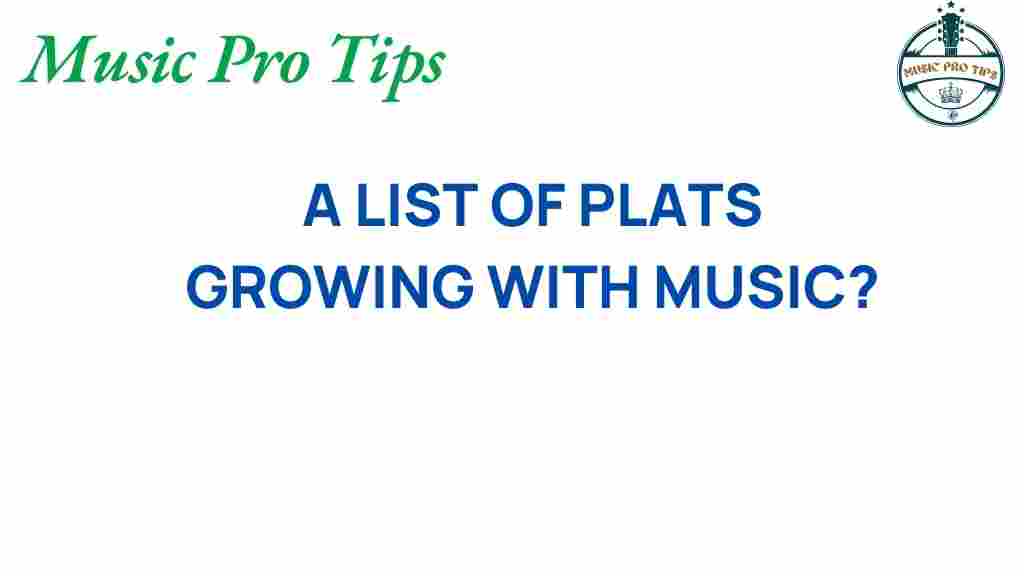Can Music Really Help Your Plants Grow? Discover the Science Behind It
Gardening enthusiasts often seek innovative ways to enhance plant growth and overall health. One intriguing method that has garnered attention is the use of music. Many gardeners swear by the benefits of playing music for their plants, claiming it encourages growth and vitality. But is there any scientific basis for these claims? In this article, we will explore the relationship between music and plant growth, delving into the research surrounding sound waves, vibrations, and their effects on gardening.
The Science of Sound Waves and Plant Growth
Plants are known to respond to their environment, and sound is a crucial aspect of that environment. Sound waves can influence plant growth in several ways:
- Vibration Responses: Plants can detect vibrations caused by sound waves. These vibrations may stimulate various biological processes.
- Growth Hormone Activation: Some studies suggest that sound waves can enhance the production of growth hormones in plants.
- Microbial Activity: Music may influence the microbial ecosystem in the soil, promoting healthier growth conditions.
Research Supporting Music and Plant Growth
Numerous scientific studies have explored the impact of music on plant growth. Here are some noteworthy findings:
- Dr. T.C. Singh’s Study: A well-known study conducted by Dr. T.C. Singh in the 1960s demonstrated that plants exposed to classical music showed significant growth compared to those that were not.
- University of California Study: Research from the University of California revealed that plants exposed to specific frequencies of sound waves exhibited increased growth rates and a higher yield of fruits.
- Sound Frequency Effects: Studies have shown that different genres of music, such as classical or rock, can produce varying effects on plant growth.
How to Use Music for Your Plants
If you’re interested in experimenting with music to promote plant growth, follow these simple steps:
Step 1: Choose the Right Music
Select music that is soothing and has a steady rhythm. Classical music, especially compositions by Bach or Mozart, is often recommended. Avoid loud or chaotic music, as it can create stress for your plants.
Step 2: Determine the Optimal Volume
Keep the volume at a moderate level. Too loud can be harmful, while too soft may not have an effect. Aim for a volume that is comfortable for you to listen to.
Step 3: Set a Schedule
Play music for your plants regularly. A good starting point is to play music for 15-30 minutes a day. You can increase this time based on your observations of plant health.
Step 4: Observe Your Plants
Take notes on your plants’ growth patterns, health, and overall vitality. Document any changes you notice after introducing music into their environment.
Troubleshooting Tips
- Monitor Plant Health: If your plants show signs of stress or decline, consider adjusting the volume or changing the type of music.
- Environmental Factors: Ensure that other environmental factors, such as light, water, and soil quality, are optimal for growth.
- Vibration Sensitivity: Some plants may be more sensitive to vibrations than others. Experiment with different distances from the speaker.
Conclusion
The relationship between music and plant growth is a fascinating area of research that blends nature and science. While more studies are needed to fully understand the mechanisms at play, the existing research indicates that sound waves and vibrations can have a positive impact on plant health and growth.
Whether you’re a seasoned gardener or just starting, incorporating music into your gardening routine could be a fun and potentially beneficial practice. So why not give it a try? You may find that your plants thrive in ways you never expected.
For further reading on horticulture and the effects of sound on plants, check out this informative article. And to explore more about innovative gardening techniques, visit this resource.
This article is in the category Theory and created by MusicProTips Team
